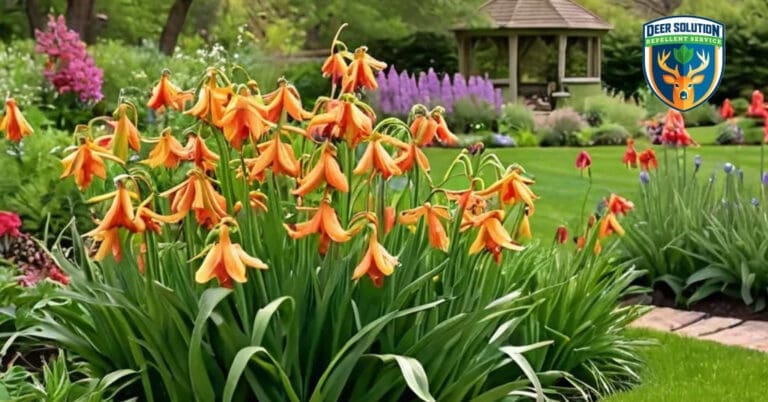Fritillarias, with their unique, bell-shaped flowers and striking colors, are a standout choice for gardeners looking to add an element of intrigue and beauty to their landscapes. But as with many garden plants, there’s always the concern of whether deer might find them appetizing. Understanding the role fritillarias play in a garden can help you protect these stunning plants while enhancing your overall garden design.
Fritillarias: The Garden’s Hidden Gem
Fritillarias are not just visually captivating; they are also highly versatile plants that can adapt to a variety of garden conditions. These plants, known for their distinctive hanging flowers, come in a range of colors that can bring both subtlety and drama to your garden. Whether planted as a focal point in a flower bed or as part of a broader landscape design, fritillarias add depth and interest to any garden layout.
One of the key reasons fritillarias are a must-have in your garden is their adaptability. They thrive in different settings, from full sun to partial shade, and can handle various soil types, making them a reliable choice for gardeners with diverse growing conditions. Additionally, fritillarias bloom in early spring, providing a burst of color at a time when many other plants have yet to awaken, ensuring your garden remains vibrant and engaging throughout the season.
Fritillarias: Supporting Biodiversity in Your Garden
Beyond their aesthetic appeal, fritillarias play a crucial role in supporting garden biodiversity. These plants are known to attract pollinators such as bees and butterflies, which are vital for the health and productivity of your garden. By incorporating fritillarias into your garden, you not only enhance its beauty but also contribute to the ecological balance, ensuring that your garden supports a wide range of beneficial wildlife.
Fritillarias also excel in companion planting, where they can be paired with other plants to create a harmonious garden ecosystem. When used in this way, fritillarias can help naturally deter pests, including deer, while supporting the growth and health of neighboring plants. Their strong, musky scent, which is unappealing to deer, adds an extra layer of protection, making them a strategic addition to any garden focused on sustainability and biodiversity.
Integrating Fritillarias into a Sustainable Garden
Fritillarias are not only beautiful but also a practical choice for sustainable gardening. These plants require minimal water, making them ideal for xeriscaping or other water-wise gardening practices. Their low-maintenance nature means they thrive with little intervention, reducing the need for chemical inputs and helping you create a garden that is both eco-friendly and resilient.
By incorporating fritillarias into your garden, you are investing in a plant that offers long-term benefits. Their resilience against pests and diseases, coupled with their ability to thrive in challenging conditions, makes them a cornerstone of sustainable garden design. Whether you’re looking to reduce your garden’s environmental impact or simply want to enjoy a beautiful, low-maintenance landscape, fritillarias are a smart and sustainable choice.
Finding the Right Balance for a Deer-Resistant Garden
Creating a garden that is both beautiful and resilient requires careful planning and plant selection. Fritillarias offer a unique combination of aesthetic appeal and practical benefits, making them an excellent choice for gardeners looking to enhance their landscapes while minimizing deer damage. By understanding the role fritillarias play in supporting biodiversity and sustainable gardening practices, you can create a thriving garden that balances beauty and resilience.
While DIY methods can be effective, those facing persistent challenges with deer may benefit from professional guidance. Deer Solution offers expertise in eco-friendly landscape management, providing services designed to help gardeners maintain the health and beauty of their gardens. By partnering with Deer Solution, you can ensure that your fritillarias and other plants remain protected, allowing you to enjoy the full splendor of your garden year-round.








